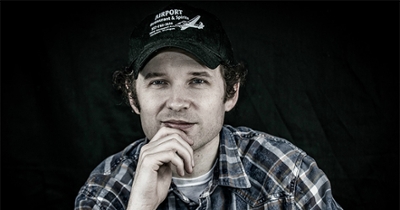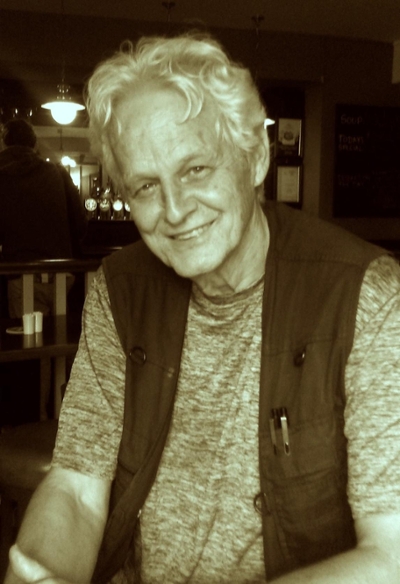Get to know: John ‘Cal’ Freeman, celebrating Detroit Mercy through poetry
 Detroit Mercy is in John Freeman’s bones.
Detroit Mercy is in John Freeman’s bones.
His father, John Freeman, was a beloved English professor whose lectures examining connections between the lyrics of Tupac Shakur and themes in William Shakespeare’s Hamlet were popular with students and taught young John to think in creative ways. The father and son also spent many afternoons and evenings at Calihan Hall, cheering on the Titans men’s basketball team and the younger John and his sister, Emily, both graduated from Detroit Mercy. John met his future wife when they were both students at the University.
“It’s obviously a place that meant a lot to me over the years,” said Freeman, who is a professor of Writing and Rhetoric at Oakland University. “It has such a great English department and I remember being in awe of all the wonderful professors.”
Many of those professors make an appearance in “University of Detroit: A Memoir with Basketball and Poetry,” a poem Freeman wrote that was published recently in the journal Permafrost. The poem will also be included in “Poolside at the Dearborn Inn,” Freeman’s second book of poetry — he publishes under the name Cal Freeman — due out in April 2022.
It is a love letter of sorts to the University and the people and events who shaped him. It weaves together names of Titans men’s basketball greats and professors who influenced him and his writing into a brief and moving memoir.
“I was just thinking of experiences that I had at the University and started to write them down,” Freeman said. “I included the names of people because I am in favor of using proper nouns when you can in a poem, even if the readers won’t know who those people are, because I think they carry a certain resonance. And I think readers will go along with it and trust you know what you’re writing about.”
 Written more than a year and a half ago, Freeman never imagined that it would become, in a way, an elegy for his father, who died unexpectedly in January.
Written more than a year and a half ago, Freeman never imagined that it would become, in a way, an elegy for his father, who died unexpectedly in January.
“The cool, spooky things about poems is that they take on meaning from things going around them.” Freeman said. “I received the galleys for proofing in the mail the day after he died.”
It seemed tragically fitting to him, as his father often lectured and wrote about “hauntology,” a concept in literary theory that, roughly speaking, concerns itself with the interaction between the past and the future.
“I hope when people read this they will remember my dad as a teacher and will read his writing,” Freeman said. “It’s really good, and I think it should be remembered.”
— By Ron Bernas. Follow Detroit Mercy on Facebook, Twitter and Instagram. Have a story idea? Let us know by submitting your idea.
University of Detroit: A Brief Memoir With Basketball and Poetry
a poem by Cal Freeman
The basketball players
collapsed in their red jerseys.
A thin dust fell
from the rafters.
*
I was born with the ponderous name
John Calvin Freeman III,
what Father Justin Kelly,
who taught the class, “Poets, Mystics,
and God,” referred to as “A Protestant
name that belies the truth.”
You might know my father,
John Calvin Freeman Jr.
He teaches English in a brick building
where the ceiling tiles
regularly peel from their glue
and plummet.
I’m convinced he’s among the last men
to shoot a sky hook,
anchoring his left leg and swooping
his right arm across
his body like a crane’s wing.
He does not sleep.
My father teaches Tupac’s lyrics
to his poetry classes.
He reads the rapper’s tattoos
through the dialectics
of elegy and self-protection:
names of murdered friends,
the words, My only fear of death
is coming back reincarnated,
on Shakur’s left bicep.
Tupac’s fear was realized
when they brought him back
as a hologram to perform
at Coachella in 2012.
“Outsourcing here takes on
the quality of outsourcery,”
my father writes—
amortization, immaterial
labor performed by the dead.
*
In the early-90s my parents
would take me to see
Ricky Byrdsong’s teams play.
Later that decade
Byrdsong would be gunned down
by a white supremacist
while jogging with his children.
*
In a windowless white room
Claire Crabtree writes a poem
about a woman sewing
green thread through her iris,
an eye to be looked at, not through,
turned inward.
*
My mother takes an independent study
with Father Kelly
and stages a dramatic reading
of “The Leaden Echo
and the Golden Echo.”
*
A clocktower squeezes out the minutes
and chimes the half-hour,
the names of the long-dead
soldiers of the War to End
All Wars etched into its base.
*
The year before Clint Hurst dies
I visit his office every Thursday
to go over Keats’ Odes and Letters.
I come to admire the way he stared
at poesy’s blank margin
after that first spatter
of blood had spelled his doom.
*
Chris Gilliard lectures
about digital red-lining
and the surveillance state,
how it’s no abstraction
for black bodies harmed
by Silicon Valley innovations,
how resistance movements
are forged in the very private
spaces carceral surveillance
seeks to penetrate.
*
Spencer Haywood, to my knowledge,
has not returned.
His time in the NBA was marred
by drug addiction and paranoia.
He was the first player
to utilize the hardship clause
and go pro early.
Dick Vitale returned a decade ago
for a court dedication
in his name. Former players
John Long and Terry Duerod
were on hand.
After his retirement from the NBA
Terry Duerod served 27 years
with the Detroit Fire Department,
Engine 55 on Joy Road
on the city’s northwest side.
He played on the firemen’s team,
never once bragging to the young guys
about the 1980 NBA Finals
or the ’77 Sweet Sixteen.
*
As a kid I’d sneak into
the empty press box at Calihan Hall
while my dad played pick-up games,
trying to sort the dull
action into language,
mimicking George Blaha’s
and Dick Vitale’s play-by-play.
*
My mother has MS now
and cannot drive,
can barely walk. My father
spends a year-long sabbatical
writing about George Antheil’s
and Hedy Lamarr’s collaborations,
the signal-jamming qualities
of Antheil’s noise, the birth
of wifi. He drives my mother
to therapy and doctor’s appointments,
reading Abraham and Torok
in antiseptic waiting rooms.
My mother speaks of her illness
in clinical terms, the degradation
of the myelin sheath and scarring.
My mother’s myelin sheath
is a hopelessly encrypted code,
a jammed signal,
an erstwhile technology.
She writes a poem
about Van Eyck’s Arnolfini Wedding,
the convex mirror
behind the hearth revealing
the painter at work, a curious
black dog at his feet,
the sort of mirror one finds
in Detroit party stores for the purpose
of surveilling black youth.
My mother argues that this painting
is a holographic image, writing,
“This ‘violent perspective’
is a diverging lens that splits
the original laser beam
into reference and object beams.”
An epithalamion of sorts
for a man who stayed with her
through several suicide attempts
and years of manic paranoia.
*
Sarah Pazur reads Anne Sexton
on a coffee-stained orange couch
in the writing center.
She tells me Sexton would drink
vodka martinis while chain-smoking
cigarettes every afternoon in the sunlight
by the pool, thumbing through
her dog-eared rhyming dictionary,
letting the inherited sounds of the language
itself punctuate her thoughts;
that’s precisely what she’d like
to do with the rest of her life.
Five years later we are married
on a grey September day
at Gesu Church in a ceremony
officiated by Father Kelly.
*
My mother recites
“The Wreck of the Deutschland”
to a synthespian
Gerard Manley Hopkins:
I am soft sift
In an hourglass—at the wall
Fast, but mined with a motion, a drift.
*
In my Western Civilization course
Claire Crabtree speaks of
Odysseus in the mead hall
on the island of Scherie
sobbing as Demodocus sings
of the disguised hero’s decades
of wandering and wrack.
Demodocus fuses epithet to melody
and rests the lyre’s tortoise shell
against his stomach to feel
the exiled creature’s reverberating
voice, and in this gesture
we begin to understand
the subtle difference
between poetry and song.
Outside the hall, young Phaeacians
hold contests of skill
in honor of the gods.
A hook shot clanks
from a back rim, soles
squeak over maple planks.
